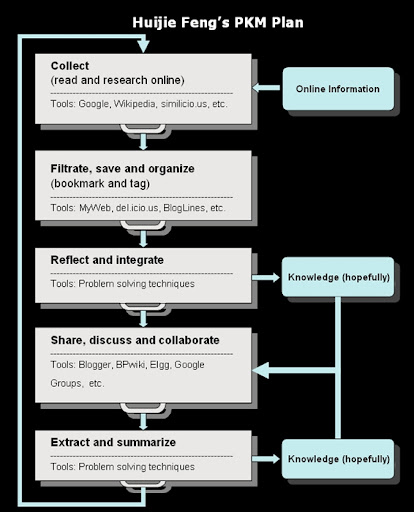This Personal Knowledge Management (PKM) Plan outlines how I plan to successfully use online knowledge management tools, primarily Web 2.0 tools, to manage my knowledge and discusses what I considered, analyzed and reflected upon the plan.
II. Background
1) I am a graduate student of communications and technology who want to manage my personal knowledge more effectively and improve my informal learning.
2) I am familiar with traditional online knowledge management tools such as Web-CT and electronic libraries.
3) I use wikis and blogs frequently, but I am still a novice to other relatively recent Web 2.0 tools.
4) I have had four blogs for different purposes.
5) I am a member of MACT 2.0 Social Spaces community at Elgg.
6) I began to use del.icio.us and Google Groups recently.
III. Personal Knowledge Management Plan
·Key Objectives
1) Take advantage of some of the Web 2.0 tools and other online knowledge management tools to create, store, share, and apply my personal knowledge more effectively
2) Look for better ways to take control of and manage my own learning, especially informal learning
·Actions
1) Move towards reading and researching online to expand my knowledge sources
·Reading sources:All kinds of websites, including electronic libraries, blogs, wikis, newsgroups/discussion groups, etc.
·Research tools: Use Google , Google Scholar, Wikipedia , Webopedia or Yahoo's Answers to find the answer to a specific question; use similicio.us to find similar sites or related articles; use social bookmarking tools (e.g., Yahoo's MyWeb , del.icio.us and Furl) to find related sites that are linked by others; join Google Groups to discuss specific issues with others.
2) Filtrate, save and organize the online information collected during the reading and researching processes
·Tools: Use social bookmarking tools mentioned above to save, share and retrieve web pages that I want to get back to details later; use BlogLines to subscribe to and manage lots of web information, especially blogs, more effectively
3) Reflect the information or knowledge and write notes about my thoughts, discoveries and questions
4) Share my reflections and discuss/collaborate with other bloggers or community/group members
·Tools: Google's Blogger, BPwiki, Google Groups, Elgg (join other networked communities other than Elgg eg. Friendster, Second Life, Jambo Network, Blue Dot, Orkut, Ning, Zopto, Meetup, Linkedin, Tribe… if necessary)
5) Extract and summarize my gained knowledge as well as my learning experience and again, share them with others
Those interactive actions will be carried out iteratively. This process can be represented as shown in figure 1:

Figure1:Huijie Feng's PKM Plan
·Timelines
1)October 25th to 31th : sign-up BPwiki,BlogLines and MyWeb and review the help information
2)November 1st to 7th : explore the tools which I plan to use more deeply
3)Since now spend around 15 hours per week on online reading and researching
4)Since now create a blog post or a wiki page at least once a week
5)Since now summarize my learning experience at least once a season
·Outcomes
Hopefully, this plan will help me realize the two key objectives located above.
IV. Discussions
When developing this PKM plan, I primarily took the following principles into consideration:
First, although I suggest many tools in my plan, I always believe that PKM is more about personal needs, practices and attitude than any given tools. My plan will work for me just because it suits my following knowledge management needs, practices and attitude:
·I have a strong motivation to engage in continuous learning. Cross (2003) argues that formal learning is "the source of only 10% to 20% of what we learn at work". Many KM researchers and professionals suggest that both formal and informal learning requires human interaction. Web 2.0 tools, which "let people collabrate and share information in previously unavailable ways"(Wikipedia, 2006), are quite useful for both formal and informal learning. Therefore, I need to consider using those tools to improve my life-long learning, which is mainly informal.
·I am interested in exploring online knowledge management tools, especially web 2.0 tools.
·While I still skim paper publications, I enjoy spending more time with online sources which are more updated and diverse.
·I have got into the habit of writing down my thoughts in my blogs and then sharing and discussing them with others.
Second, I strongly agree with Wright (2005) that PKM "involves a combination of information, cognition and social competencies." With this plan, I have chances to access, store, organize and integrate suitable and current information resources, develop and improve my problem solving skills, extend my social networks, work in formal or informal communities, and collaborate with others more productive, effective and innovative than before. In short, the plan has the potential to facilitate my PKM process.
References:
Cross, J. (2003).Informal Learning – the other 80%. Retrieved October 23,2006 from http://internettime.com/Learning/The%20Other%2080%.htm
Wright, K. (2005). Personal knowledge management: Supporting individual knowledge worker performance. Knowledge Management Research and Practice.
Wikipedia (2006).Web 2.0 . Retrieved October 23, 2006 from http://en.wikipedia.org/wiki/Web_2.0.